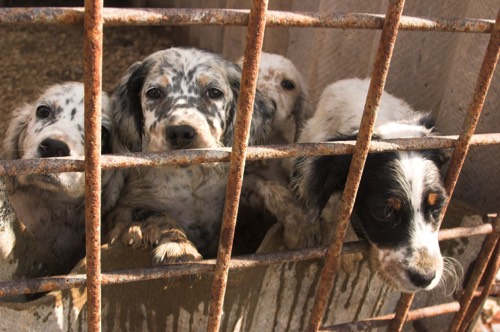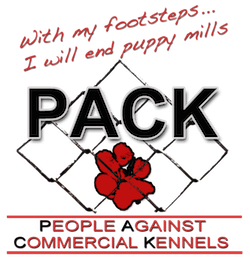WHAT IS A PUPPY MILL AND WHY ARE WE RAISING AWARENESS ABOUT THEM?
"USDA licensed kennels" (puppy mills) are large-scale dog breeding facilities. They are notorious for the substandard care and cruelty toward animals. Dogs in puppy mills often spend their entire lives in tiny, filthy, cramped wire cages, unprotected in extreme weather conditions. These parents suffer from over-breeding, lack of veterinary care, and inadequate food & water. They will never be touched with kindness.
According to the Humane Society of the United States there are over 10,000 puppy mills throughout our country. Millers profit by offering a never ending supply of puppies, which they sell to the unassuming public through pet stores, websites, and various forms of advertisements in newspaper ads.
Emotionally and physically ravaged by their lives in the mills, the dogs suffer in silence day after day. To see an end to the deplorable and disturbing conditions endured by these dogs, the public must first be made aware about the hidden truth behind puppy mills. We need to learn the truth and awakened! DON'T SHOP! RESCUE or ADOPT! There are millions of wonderful homeless dogs of all shapes and sizes available for adoption at your local animal shelter.
PET SHOPS
- Reputable breeders DO NOT sell to pet shops and puppies in pet shops are probably the most cheaply produced companion animals on the market.
- Close to 99% of ALL pet shop puppies come from commercial breeding kennels (aka: puppy mills) and pet shops are required to provide consumers with paperwork showing where the pup comes from.
- Some pet shops now claim to offer “adoptions.” If the puppy you’re interested in comes with “papers” or if the adoption fee is in excess of $300, BEWARE! This is NOT an adoption – it’s a sale.
- If the paperwork indicates a kennel in Missouri, Kansas, Oklahoma, Nebraska, Iowa, Arkansas, Ohio, or in Pennsylvania this is more than likely a commercial breeding kennel - that's right, a puppy mill!
- You can NOT rescue a dog from a pet shop. Buying from a pet shop only guarantees that more puppy mill dogs will be bred and the cages will always be filled.
KENNELS/BREEDERS
- Commercial breeders are smart! They know how to stage a setting so that consumers believe they are a “reputable” breeders.
- Quality breeders tend to breed only one type of dog, do NOT have puppies available year round and will not sell a puppy younger than 8 weeks of age. They will always take a dog back regardless of age.
- Puppies should be accompanied by a complete shot and worming record as well as an original health certificate completed and signed by a licensed veterinarian. Do NOT accept Xerox copies of signatures!
- Ask to see both the mother and father of the puppies and expect to complete an application and possibly be placed on a waiting list.
INTERNET SITES AND NEWSPAPER ADS
- Reputable breeders DO NOT ship dogs – they want to meet the people who are interested in purchasing one of their puppies.
- Keep in mind that internet websites can and do use beautiful pictures that many times DO NOT represent the actual kennel where the puppy is located.
- Many people feel that if a dog has “papers” then the dog is a “good” dog. AKC papers DO NOT guarantee good health or sound temperament.
- The American Kennel Club is simply a registry for purebred dogs. And the American Canine Association (ACA papers) has routinely issued papers to breeders convicted of animal cruelty.
- “Papers” increase the asking price of a dog by $300-$500 and consumers mistakenly believe that these papers ensure they are buying a puppy free of disease and without behavioral or genetic problems. Unfortunately, this is not often the case.
- • Beware of telephone numbers with area codes for Missouri, Kansas, Oklahoma, Nebraska, Iowa, Arkansas, Ohio and Pennsylvania.
RESCUES
- Anyone may open a rescue.
- Look for rescues helping LOCAL dogs who have been pulled from LOCAL shelters.
- A reputable rescue will NOT adopt out a dog who is not spayed/neutered. They WILL require you to complete an application. They WILL perform a home visit. Customary adoption fees fall into the $100-$300 range.
- More importantly, you’ll know that your money is going to help other dogs versus helping a breeder to profit.
- Shelter adoption fees are usually less.
- Rescue dogs are a bargain! Usually up-to-date on shots, altered and many times housebroken, it’s one of the best way to find a new best friend!
AKC, ACA, APRI, APR, or CKC Papers
Are No Guarantee That Your Puppy Didn't Come From a Puppy Mill
Many people believe that if a dog has “papers” then they have a “good” dog. AKC papers DO NOT guarantee good health or sound temperament. The American Kennel Club is simply a registry for purebred dogs. And the American Canine Association (ACA papers) has routinely issued papers to breeders convicted of animal cruelty. “Papers” increase the asking price of a dog by $300-$500 and consumers mistakenly believe that these papers ensure they are buying a puppy free of disease and without behavioral or congenital illness. Unfortunately, this is not often the case.
Saying you have a 'registered' dog, really means very little. It simply means that the name of the dog's mother and father are listed somewhere in the AKC registry. The AKC inspects very few kennels and even fewer litters and, until recently, largely depended upon the honesty of the person completing the registration papers to provide accurate and true information to the organization in order to preserve the integrity of the AKC's 'stud book.'
The AKC isn't the only club registry for dogs. There is also the ACA, APRI, APR, CKC. Most registries give their seal of approval to puppy mill dogs. So buying beware!
The fact is, the AKC relies on puppy mills for a large part of its revenues. Again: Buyer beware!

